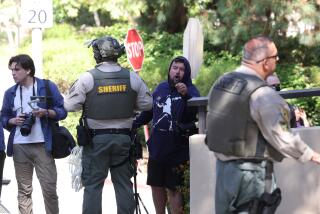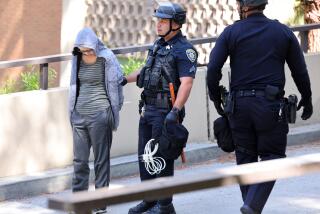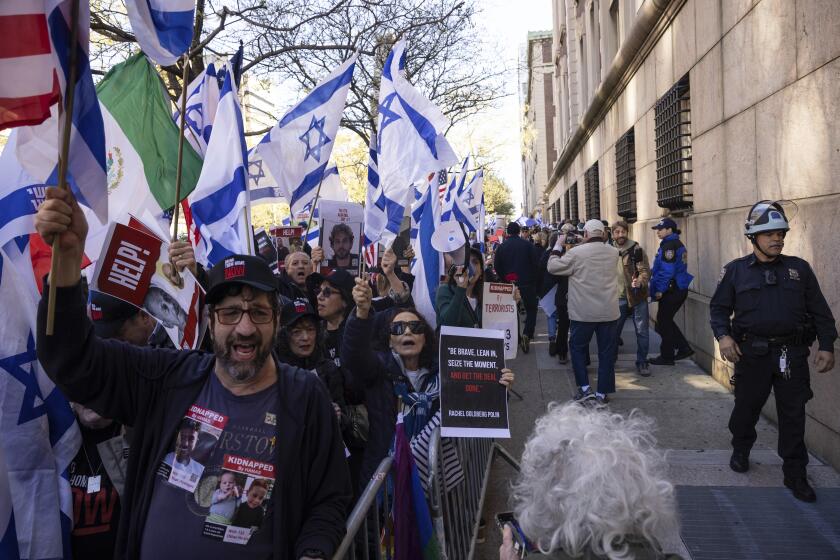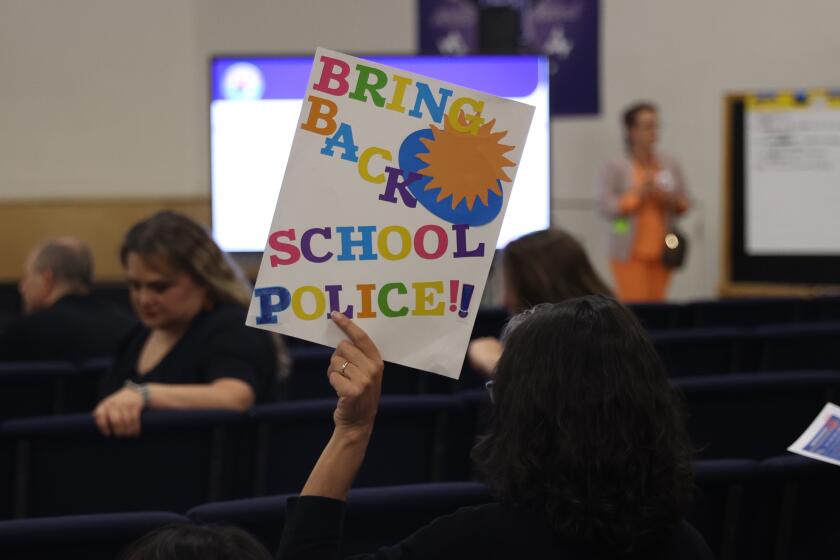Educators Angered by Tapes of Lecture Found in Gates’ File
Rancho Santiago College officials expressed anger and concern Friday that audiotape recordings of a classroom lecture by police administration instructor George Wright ended up in Orange County Sheriff Brad Gates’ investigative files.
Jim Harris, vice president of the college’s Academic Senate, the faculty’s representative body at the Santa Ana community college, said the matter will be taken up at the Senate’s meeting on Tuesday.
“It’s the sort of issue that we’re also likely to refer to the statewide (Community College) Academic Senate,” said Harris, an English instructor who lives in Garden Grove. “We’ll probably pass a resolution on this in our Academic Senate and send it to the (Orange County) sheriff’s office.”
Both Gates and his lawyers continued to refuse comment on the tapes Friday. Gates referred questions to lawyers who defended him in the lawsuit during which the tapes surfaced, and one of them, Richard Simon, declined comment as well. “The case is settled, and as far as I’m concerned, the case is over,” Simon said.
Gates’ attorneys had been preparing for trial in a civil rights lawsuit filed by Wright, Municipal Judge Bobby D. Youngblood and George Patrick Bland. The three, all of whom had been candidates for sheriff against Gates, alleged that the sheriff improperly used his office to harass and spy on them.
But county officials agreed on April 2 to pay Youngblood and the other plaintiffs a total of $375,000 to settle the case.
Wright said he was outraged that the March, 1981, tape recordings were made in “the last bastion of open debate . . . the classroom.” He said he believes that the recordings were made because he had announced that he would run against Gates in 1982. Wright had unsuccessfully run against Gates in 1978.
Wright ultimately dropped out of the 1982 race.
“California has so far had a good record of keeping political and religious incursions out of the classroom, and we don’t want it to start here. . . ,” Harris, of the Academic Senate, said Friday. “This is something we see as being very serious.”
“Teachers need to be able to instruct in their classrooms without fear. Teachers should be able to pursue information and discussion in class without problems such as this,” he said.
According to John Oskins, Orange County’s risk management director, the tapes may have been recorded by an informant for the Sheriff’s Department.
Gates’ attorney provided the tapes to Youngblood’s attorney on March 27 and offered to settle the case the same day. Trial was scheduled to begin 18 days later.
Although in 1986 he was dismissed as a plaintiff in the case, Wright said he will receive $88,000 of the $375,000 settlement. Bland, Youngblood and their attorney, Michael Cisarik, will share the balance of the $375,000 settlement.
According to Cisarik, the emergence of the tapes on the eve of trial played a significant role in the county’s decision to offer the settlement.
County officials, however, said the tapes were not the primary reason for settling the case and cited instead the expense of a long trial and the possibility of losing.
Carter Doran, Rancho Santiago College vice chancellor of academic affairs, said Friday that he was “saddened to think that anyone might have taped an instructor’s classroom lecture for any other reasons than an educational one.”
“Academic freedom is an important concept in the educational world, and we must protect that at all costs,” Doran said.
Rancho Santiago Community College District trustee Carol Enos said she “deplored” secret tapings as being an invasion of academic freedom.
‘Stifles Free Discussion’
“If the taping (of Wright) occurred as reported,” said Enos, “it is the sort of thing that I think stifles free discussion and academic freedom in the classrooms. I deplore any gathering of information or taping in the classroom that isn’t related to education.
“I think that such things not only hinder professors from free discussion, but they also would make students hesitant to speak and exchange opinions in class.”
Enos is a past president of the statewide California Community College Trustees Assn., and she noted that the association militantly opposes invasions of academic freedom, such as surreptitious tape recordings.
County officials acknowledged Thursday that the Wright tapes were not turned over to Youngblood’s attorney last December with other evidence as ordered by U.S. District Judge John G. Davies. Under the order, two large boxes of confidential surveillance reports and audiotapes were turned over to Youngblood to prepare for trial.
Gates first provided the investigative documents to the court in December, 1984, so judges could determine whether they should be given to Youngblood’s attorney.
Wright was dismissed from the suit in March, 1986, by U.S. District Judge Richard A. Gadbois, who reviewed the documents and said he found nothing pertaining to Wright.
In a declaration filed on Feb. 6, 1985, Gates had stated under oath that “the Orange County Sheriff’s Department does not and has not created or maintained files concerning Bobby D. Youngblood, George Patrick Bland or George Wright, other than which have already been produced.”
Surveillance Denied
“Neither I nor my department has conducted any surveillance of or have monitored the activities of . . . George Wright,” Gates stated in the declaration. “Nor is it the custom, policy or practice of this declarant or of the Orange County Sheriff’s Department to surveil and/or monitor the lawful activities of citizens of this county because of their political criticism of myself or my department.”
The files were copied and delivered to Youngblood’s attorney in December, 1986, about two weeks after Davies’ order, according to Cisarik.
Despite Gates’ declaration, the Wright tapes were discovered by the private attorneys hired to represent him and the county in the trial.
Orange County Counsel Edward N. Duran, whose office also represented the county and Gates, said that “as soon as they got (the tapes) they turned (them) over to” Youngblood’s attorney.
Duran said there may be legitimate reasons for the tape recording. “They might have been investigating somebody else.”
Simon and other attorneys from the Los Angeles law firm of Kadison, Pfaelzer, Woodard, Quinn &Rossi; were hired about a year ago to represent the county and Gates in the Youngblood suit because of the firm’s expertise and experience in federal court, Duran said Friday. The firm took over the case from the Santa Ana firm of Portigal, Hammerton & Allen.
Duran said he was advised of the tapes’ existence by the new attorney in the case. Duran added that he understood the delay in turning over the tapes was not the fault of either law firm.
More to Read
Start your day right
Sign up for Essential California for news, features and recommendations from the L.A. Times and beyond in your inbox six days a week.
You may occasionally receive promotional content from the Los Angeles Times.






